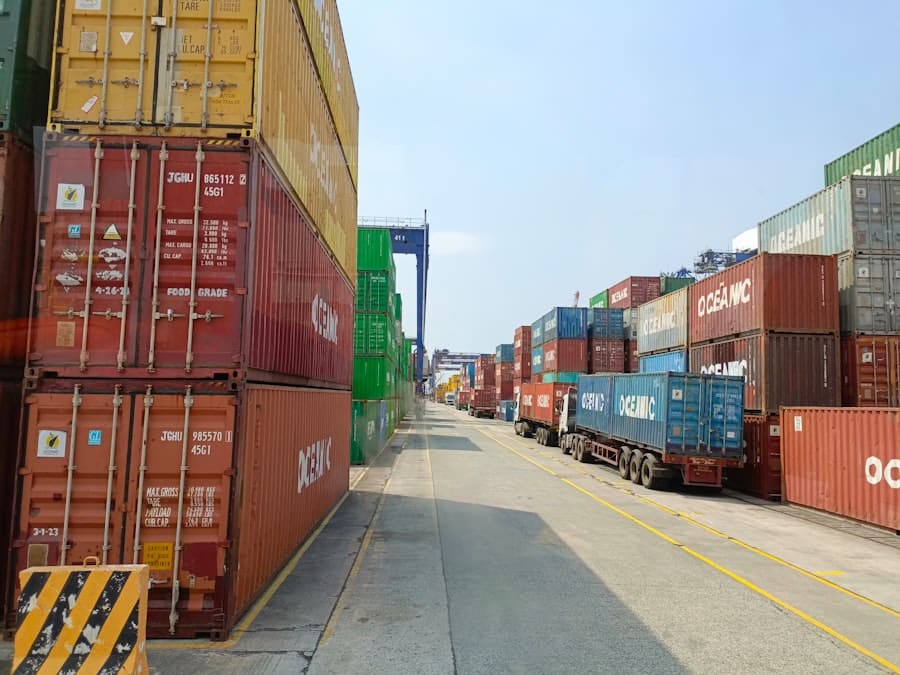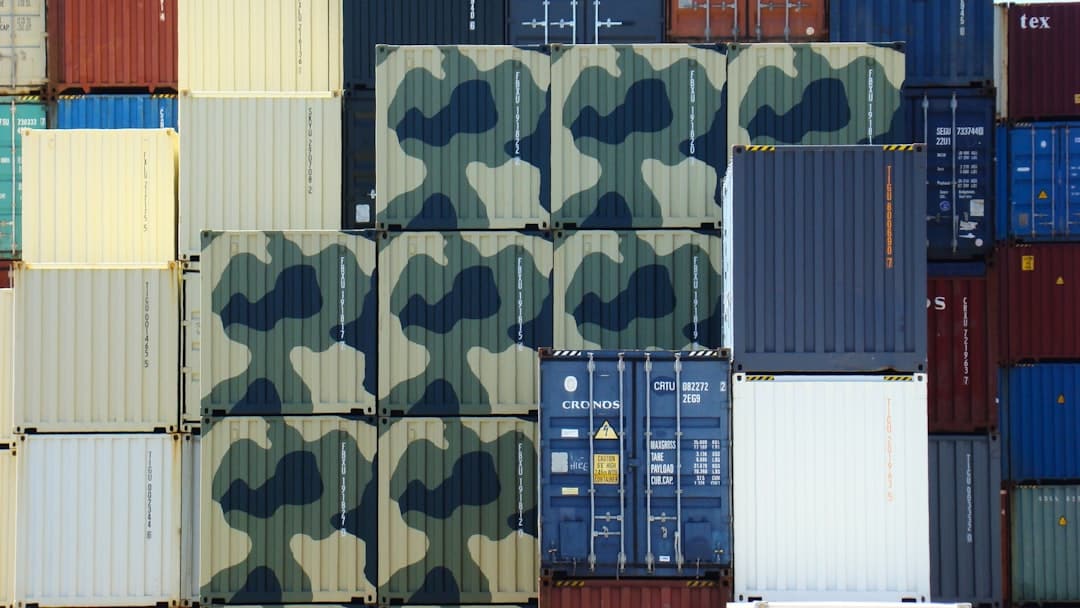Supply chain security is a critical aspect of modern business operations, encompassing the protection of goods, information, and services as they move through various stages of production and distribution. In an increasingly interconnected world, where businesses rely on global networks to source materials and deliver products, the integrity of the supply chain has become paramount. A secure supply chain not only ensures the smooth flow of goods but also safeguards a company’s reputation, financial stability, and customer trust.
The importance of supply chain security extends beyond mere logistics; it is a strategic imperative that can significantly influence a company’s competitive advantage. The ramifications of neglecting supply chain security can be severe. Companies that fail to implement robust security measures expose themselves to a myriad of risks, including theft, fraud, and operational disruptions.
Moreover, the complexity of modern supply chains, which often involve multiple stakeholders across various geographical locations, makes them vulnerable to a range of threats. As businesses increasingly adopt just-in-time inventory practices and lean manufacturing techniques, the need for a secure supply chain becomes even more critical. A single breach can lead to cascading failures throughout the network, underscoring the necessity for comprehensive security strategies.
Key Takeaways
- Supply chain security is crucial for businesses to ensure the safety and integrity of their products and operations.
- Risks and threats to supply chain security include cyber attacks, natural disasters, and counterfeit products, among others.
- Supply chain breaches can have a significant impact on businesses, leading to financial losses, reputational damage, and legal consequences.
- Strategies for enhancing supply chain security include risk assessment, supplier vetting, and implementing robust security measures.
- Technology plays a key role in supply chain security, with tools such as blockchain, IoT, and AI helping to improve transparency and traceability.
Risks and Threats to Supply Chain Security
The landscape of supply chain security is fraught with various risks and threats that can compromise the integrity of operations. One of the most pressing concerns is cyber threats, which have escalated in frequency and sophistication. Cybercriminals often target supply chains as a means to infiltrate larger organizations, exploiting vulnerabilities in third-party vendors or logistics providers.
For instance, the 2020 SolarWinds cyberattack demonstrated how attackers could compromise a widely used software platform to gain access to numerous organizations’ networks, highlighting the interconnected nature of supply chains and the potential for widespread damage. Physical threats also pose significant risks to supply chain security. Theft and vandalism can occur at any point in the supply chain, from manufacturing facilities to transportation hubs.
Cargo theft, for example, has become a prevalent issue in many regions, with organized crime syndicates targeting high-value shipments. Additionally, natural disasters such as hurricanes, earthquakes, or floods can disrupt supply chains by damaging infrastructure or halting production. The COVID-19 pandemic further illustrated how unforeseen events could lead to significant disruptions, as lockdowns and restrictions affected global trade and logistics.
The Impact of Supply Chain Breaches on Businesses

When a supply chain breach occurs, the consequences can be far-reaching and devastating for businesses. Financial losses are often the most immediate impact, as companies may face direct costs associated with theft or fraud, as well as indirect costs related to operational disruptions. For example, a manufacturer that experiences a delay in receiving critical components due to a supplier breach may incur additional expenses in expediting shipments or finding alternative sources.
Furthermore, the loss of inventory can lead to missed sales opportunities and diminished revenue. Beyond financial implications, supply chain breaches can severely damage a company’s reputation. Customers expect their suppliers to maintain high standards of security and reliability; any failure in this regard can erode trust and lead to long-term relationship damage.
For instance, if a food supplier is found to have compromised safety standards due to inadequate supply chain security measures, it may face not only immediate backlash from consumers but also regulatory scrutiny and potential legal action. The reputational damage can extend beyond the immediate incident, affecting future business opportunities and partnerships.
Strategies for Enhancing Supply Chain Security
To mitigate risks and enhance supply chain security, businesses must adopt a multifaceted approach that encompasses various strategies.
By evaluating each link in the chain—from suppliers to logistics providers—companies can pinpoint areas that require enhanced security measures.
This proactive approach allows organizations to prioritize their resources effectively and implement targeted interventions. Another critical strategy involves fostering collaboration among supply chain partners. Establishing strong relationships with suppliers and logistics providers can enhance communication and information sharing regarding potential threats.
Joint training sessions and workshops can help build awareness of security best practices across the entire supply chain network. Additionally, implementing standardized security protocols and compliance measures can create a more resilient supply chain ecosystem where all parties are aligned in their commitment to security.
The Role of Technology in Supply Chain Security
Technology plays an increasingly vital role in enhancing supply chain security by providing tools and solutions that help organizations monitor and protect their operations. Advanced technologies such as blockchain offer unprecedented transparency and traceability within the supply chain. By recording every transaction on an immutable ledger, blockchain technology enables companies to verify the authenticity of products and track their movement throughout the supply chain.
This level of visibility can deter fraud and ensure compliance with safety standards. Moreover, artificial intelligence (AI) and machine learning are transforming how businesses approach supply chain security. These technologies can analyze vast amounts of data to identify patterns and anomalies that may indicate potential threats.
Additionally, predictive analytics can help organizations anticipate disruptions by analyzing historical data and external factors such as geopolitical events or natural disasters.
Regulatory and Compliance Considerations for Supply Chain Security

As concerns about supply chain security continue to grow, regulatory bodies are increasingly imposing requirements on businesses to ensure compliance with security standards. Various industries are subject to specific regulations that mandate certain security practices; for example, the Food Safety Modernization Act (FSMA) requires food manufacturers to implement preventive controls throughout their supply chains to mitigate risks related to food safety. Similarly, the Health Insurance Portability and Accountability Act (HIPAA) imposes strict requirements on healthcare organizations regarding the protection of patient data within their supply chains.
Compliance with these regulations not only helps businesses avoid legal repercussions but also enhances their overall security posture. Organizations must stay informed about evolving regulations and ensure that their supply chain partners are also compliant. This may involve conducting regular audits and assessments of suppliers’ security practices to verify adherence to relevant standards.
By fostering a culture of compliance throughout the supply chain, businesses can create a more secure environment that protects both their operations and their customers.
Building Resilience in the Supply Chain
Building resilience within the supply chain is essential for organizations seeking to navigate an increasingly volatile landscape marked by disruptions and uncertainties. Resilience refers to the ability of a supply chain to adapt and recover from adverse events while maintaining operational continuity. One key aspect of building resilience is diversifying suppliers and sourcing strategies.
Relying on a single supplier or geographic region can expose businesses to significant risks; by diversifying their supplier base, companies can mitigate the impact of disruptions caused by localized events. Additionally, investing in redundancy within the supply chain can enhance resilience. This may involve maintaining buffer stock or alternative transportation routes to ensure that operations can continue even in the face of unexpected challenges.
Companies should also develop contingency plans that outline specific actions to take during various types of disruptions—whether they be natural disasters, cyberattacks, or geopolitical tensions. Regularly testing these plans through simulations or drills can help organizations identify weaknesses and refine their response strategies.
The Future of Supply Chain Security: Trends and Developments
As we look toward the future of supply chain security, several trends are emerging that will shape how businesses approach this critical aspect of their operations. One notable trend is the increasing emphasis on sustainability within supply chains. As consumers become more environmentally conscious, companies are under pressure to ensure that their supply chains are not only secure but also sustainable.
This includes evaluating suppliers’ environmental practices and ensuring compliance with regulations related to sustainability. Another significant development is the growing adoption of digital twins—virtual replicas of physical assets or processes—that allow organizations to simulate different scenarios within their supply chains. By leveraging digital twins, companies can assess potential vulnerabilities and test various security measures in a controlled environment before implementing them in real-world operations.
This innovative approach enables businesses to proactively address risks while optimizing their overall supply chain performance. In conclusion, as global trade continues to evolve and new threats emerge, the importance of robust supply chain security cannot be overstated. Organizations must remain vigilant in identifying risks, implementing effective strategies, leveraging technology, ensuring compliance with regulations, building resilience, and adapting to emerging trends in order to safeguard their operations against potential breaches and disruptions.
In today’s rapidly evolving business landscape, ensuring the security of supply chains has become a paramount concern for corporations worldwide. As highlighted in the article “Why Supply Chain Security Is the New Corporate Priority,” companies are increasingly focusing on safeguarding their supply chains to mitigate risks and maintain operational resilience. A related article that delves into the importance of robust systems and tools in achieving these goals is The Best Software for Interior Design in 2023. While this article primarily discusses software solutions for interior design, it underscores the broader theme of leveraging advanced technology to enhance efficiency and security across various sectors, including supply chain management.
FAQs
What is supply chain security?
Supply chain security refers to the measures and practices put in place to ensure the integrity and safety of a company’s supply chain, including the sourcing, manufacturing, transportation, and delivery of goods and services.
Why is supply chain security important?
Supply chain security is important because it helps protect companies from potential risks such as theft, counterfeiting, tampering, and other security breaches that could impact the quality and safety of their products, as well as their reputation and bottom line.
What are some common threats to supply chain security?
Common threats to supply chain security include theft, cyber attacks, natural disasters, counterfeit products, and unauthorized access to sensitive information.
How can companies improve supply chain security?
Companies can improve supply chain security by implementing security protocols, conducting risk assessments, using technology such as blockchain and RFID, vetting suppliers and partners, and training employees on security best practices.
What are the potential consequences of a supply chain security breach?
Potential consequences of a supply chain security breach include financial losses, damage to reputation, legal liabilities, regulatory fines, and disruptions to operations and customer trust.

